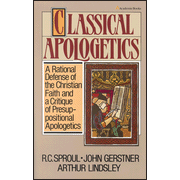The Reformed Doctrine of Predestination Chapter XVII- That it make God the Author of Sin
The Reformed Doctrine Of Predestination
Chapter XVII
That It Makes God the Author of Sin
10. CALVINISM OFFERS A MORE SATISFACTORY SOLUTION OF THE PROBLEM OF EVIL THAN DOES ANY OTHER SYSTEM
The real difficulty which we face here, is to explain why a God of infinite holiness, power, and wisdom, would have brought into existence a creation in which moral evil was to prevail so extensively; and especially to explain why it should have been permitted to issue in the everlasting misery of so many of His creatures. This difficulty, however, bears not only against Calvinism, but against theism in general; and while other systems are found to be wholly inadequate in their explanation of sin, Calvinism can give a fairly adequate explanation in that it recognizes that God is ultimately responsible since He could have prevented it; and Calvinism further asserts that God has a definite purpose in the permission of every individual sin having ordained it “for His own glory.” As Hamilton says, “If we are to accept theism at all, the only respectable kind is Calvinism.” “Calvinism teaches that God not only knew what He was doing when He created man, but that He had a purpose even in permitting sin.” And what better explanation than this can be advanced by any one else who believes that God is the Creator and Ruler of this universe?
In regard to the first fall of man, we assert that the proximate cause was the instigation of the Devil and the impulse of his own heart; and when we have established this, we, have removed all blame from God. Paul tells us that God “dwelleth in the light which no man can approach unto.” Our mental vision can no more comprehend His deep mysteries than our unaided physical eyes can endure the light of the sun. When the Apostle contemplated these things he broke forth, ‘O the depth of the riches both of the wisdom and knowledge of God! how unsearchable are His judgments and His ways past tracing out!” And since our human intellects cannot soar to such stupendous heights, it is ours to adore with reverence, fear, and trembling, but not to explain, that mystery which is too high and too deep for even the angels themselves to penetrate. Let us remember also that along with this sin, God has provided a redemption graciously wrought out by Himself; and no doubt it is due to our limitations that we do not see this to be the all-sufficient explanation. The decree of redemption is as old as the decree of apostasy; and He who ordained sin has also ordained a way of escape from it.
Since the Scriptures tell us that God is perfectly righteous, and since in all of His acts upon which we are capable of passing judgment we find that He is perfectly righteous, we trust Him in those realms which have not yet been revealed to us, believing that He has solutions for those problems which we are not able to solve. We can rest assured that the Judge of all the earth will do right, and as His plan is more fully revealed to us we learn to thank Him for that which is past and to trust him for that which is future.
It avails nothing, of course, to say that God foresaw the evil but did not include it in His plan,— for if He foresaw it and in spite of it brought the world into existence, the evil acts were certainly a part of the plan, although an undesirable part. To deny this foresight makes God blind; and He would then be conceived of as working something like the school boy who mixes chemicals in the laboratory not knowing what may happen. In fact, we could not even respect a God who worked in that manner. And furthermore, that view still leaves the ultimate responsibility for sin resting upon God, for at least he could have refrained from creating.
That the sinful acts of men have their place and a necessary place in the plan is plainly seen in the course of history. For instance, the assassination of President McKinley was a sinful act,— yet upon that act depended the role which Theodore Roosevelt was to play as President of the United States; and if that one link in the chain of events had been otherwise, the entire course of history from that time to the end of the world would have been radically different. The same is true in the case of Lincoln. If God intended that the world should reach this state in which we find ourselves today, those events were indispensable. A moment’s consideration will convince us that all of even the apparently insignificant events have their exact place, that they start rapidly growing influences which soon extend to the ends of the earth, and that if one of them had been omitted, say fifty years ago, the world today would have been far different.
A further important proof that Paul taught the doctrine which Calvinists have understood him to teach is found in the objections which he put in the mouths of his opponents,— that it represented God as unrighteous: “Is there unrighteousness with God?” Romans 9:14; and, that it destroyed man’s responsibility: “Thou wilt then say unto me, Why doth He still find fault? For who withistandeth His will?” Romans 9:19. These are the very objections which today, on first thought, spring into men’s minds, in opposition to the Calvinistic doctrine of Predestination; but they have not even the least plausibility when directed against the Arminian doctrine A doctrine which does not afford the least grounds for these objections cannot have been the one that the Apostle taught.
Loraine Boettner- The Reformed Doctrine of Predestination












Recent Comments